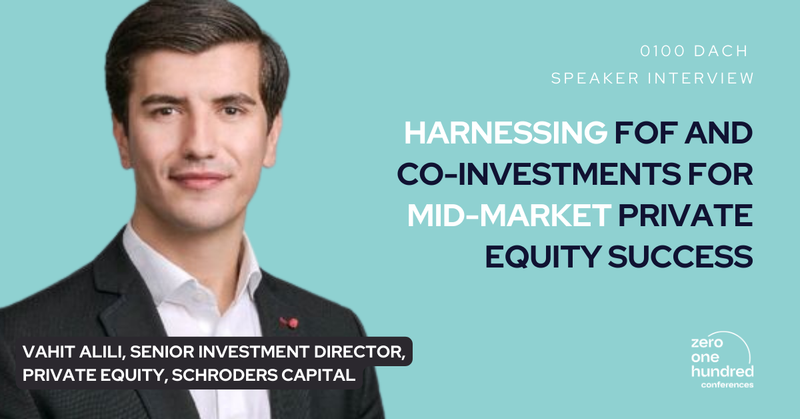Vahit Alili, Senior Investment Director in Private Equity at Schroders Capital, will be among the speakers at the upcoming 0100 DACH Conference. Scheduled to take place in Vienna from February 18–20, 2025, the event will bring together key figures in private equity to explore critical trends and opportunities in the DACH region.
Vahit will participate in the panel discussion on Portfolio Diversification via Fund-of-Funds (FoF) Investments & Co-Investments, alongside: Martin Prohazka, Managing Director at LLB Private Equity, Martin Langer, Partner at SwanCap Partners, and Roman Hürlimann, Managing Director - Private Equity Secondaries at Kline Hill Partners.
In our latest speaker interview, Vahit reflected on the challenges faced by private equity in 2024 and outlined his expectations for 2025. He emphasized the opportunities presented by improved market dynamics, the growing role of specialist managers, and the alignment of interests between investors and GPs in co-investment strategies.

How would you summarize 2024 for the private equity sector, and what is your outlook for 2025 in the DACH region?
In terms of fundraising, 2024 remained a challenging year for many GPs with a reduced level of total commitments. I believe we will see some GP consolidation, especially in the DACH region with undifferentiated generalist funds struggling the most. In terms of investments, the slower fundraising should facilitate less competition and more attractive valuations, potentially indicating a higher return potential for current vintages. In terms of private equity exits, 2024 remained behind expectations as the macro-economic picture still remains complex. However, there it is also a tale of two stories: while large cap exits have remained a rarity, we have seen more exit activity in the small-/mid market, driven by more exit optionality in the segment. With lower interest rates having come through this year, I expect a meaningful increase in investment activity by large-cap buyout managers which will further increase exit activity for small/mid managers to normalized long-term levels or even beyond those. I am more positive about 2025 than I was a year ago for 2024.
What unique opportunities does the DACH region offer for private equity investments in the mid-market segment?
The DACH region has become an increasingly attractive market for private equity. While the high family/founder ownership and market fragmentation remain and continue to offer attractive fundamentals, historical skepticism towards private equity, which has been more prevalent in Germany vs other European geographies, has reduced over the last 5-10 years. We also see a new, younger generation of successful entrepreneurs of small/mid-sized companies emerging, especially in the software, renewables, and other higher-growth industries, which are keen to capture the opportunities that partnerships with private equity offer.
How important is it to invest alongside specialist managers for mid-market opportunities? Are there particular industries where this approach is especially impactful?
We deem investing with specialist funds as critical for long-term outperformance. On a pan-European basis, we have especially seen software and healthcare specialization pay off (there is also a paper on this which we have issued: Link). While there are multiple DACH-focused software buyout investors, most of them also doing very well, we don’t see the same depth in healthcare buyout. There is certainly an opportunity there in DACH. We also see an opportunity for specialists to focus on Industrial Technology opportunities given the strong industrial backbone of the region and market characteristics which allow a focused GP to gain differentiated insights.
As a key player in European private markets, why do you believe portfolio diversification through Fund-of-Funds (FoF) investments and co-investments is crucial?
Integrated funds which include a FoF allocation or dedicated co-investment and GP-led funds are a good way to secure exposure to the small/mid buyout segment with fund sizes below €2bn. That segment still benefits from a high share of primary buyouts which have a differentiated and better risk/reward profile while the GP base remains highly fragmented and challenging to navigate for investors who don’t have the resources to be deep in the market. Many of the best funds (and fund relationships for co-investments) also remain access-restricted. In comparison, I am less convinced of the value-add in the large-cap segment given the transparency of the market, deal flow concentration, and ease of access.
How can investors effectively align their interests with GPs when pursuing co-investment strategies, especially in the context of the DACH region?
In terms of alignment of interest in co-investments, we believe there are a number of key characteristics to pay attention to: (i) a fund LP relationship which provides a long-term partnership basis beyond a transactional investment, (ii) the lead GP’s fund should invest at least a typical sweet spot ticket into the opportunity and (iii) focus on co-underwriting which allows for a more critical and intellectually honest dialogue between the lead GP and co-investors as both parties are assessing the opportunity (vs syndication where the lead GP has already executed binding agreements to acquire a business). The DACH region is not fundamentally different from other markets in that respect. However, I believe that managers in the DACH area more frequently pass on great opportunities because they involve co-investors less often than GPs in other parts of Europe.

